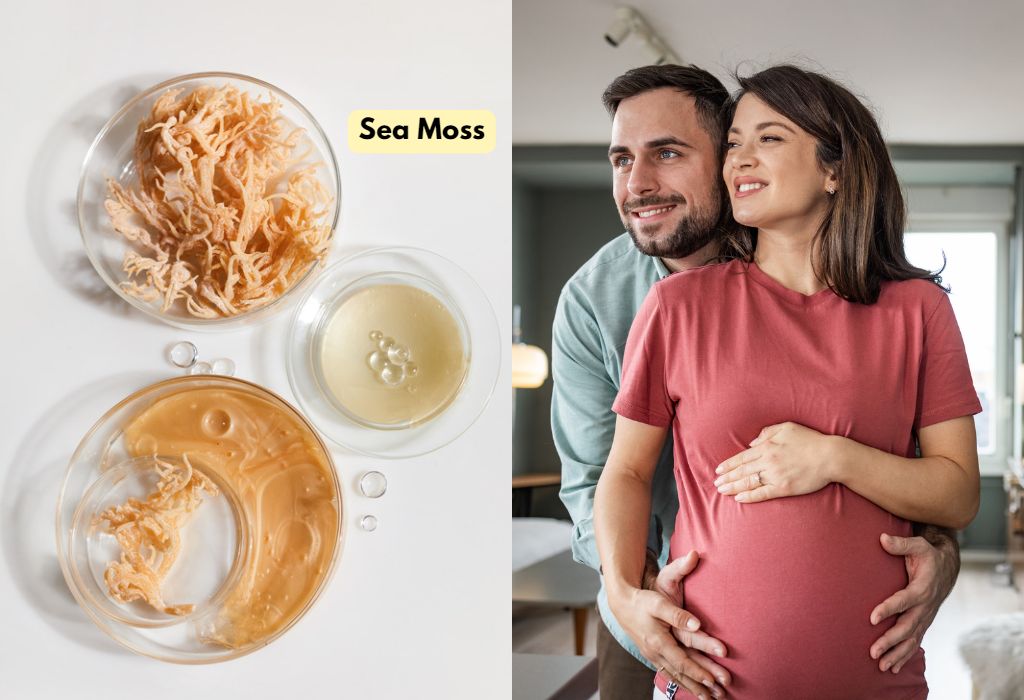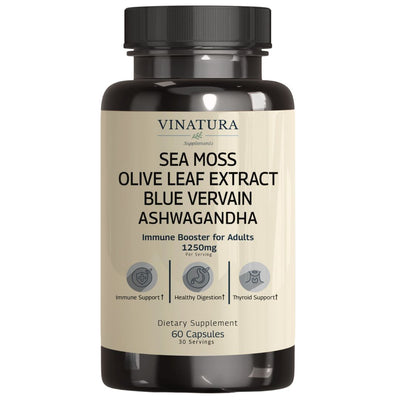
Sea Moss For Fertility In Men And Women: Does It Help?
Sea moss has been renowned for its abundant nutrients that enhance health, boost the immune system, aid digestion, and support thyroid functions. Moreover, sea moss is a valuable natural remedy for improving reproductive function. This article will delve into its mechanisms, necessary dosage, and considerations for effectively using sea moss for fertility.
Before exploring further, please read the disclaimer located at the end of this webpage.
Key Takeaways
- Sea moss can boost fertility and increase the likelihood of pregnancy.
- It contains essential vitamins and nutrients for sperm health in men and ovarian function in women, including iron, zinc, iodine, and folic acid.
- Sea moss does not increase testosterone levels in men.
- It is a versatile food that can be combined with various dishes and prepared at home.
What is Sea Moss?

Sea moss, scientifically known as Chondrus crispus, is a red algae commonly found in the North Atlantic Ocean.
It has gained popularity for containing up to 92 of the 102 essential minerals the body needs. It is rich in nutrients and vitamins, and its high carrageenan content makes it helpful in preparing foods like smoothies, ice cream, baked goods, etc.
Sea moss is considered a natural source of folic acid with antioxidant and antibacterial properties. It became trendy during the Covid-19 pandemic for its immune-boosting and overall health benefits.
What do People in the Caribbean say about Sea Moss for Fertility?
In the Caribbean, sea moss is believed to benefit reproductive health for both men and women. Locals use sea moss as a natural enhancer for male libido by regulating testosterone levels, sperm count, and quality, which in turn is thought to improve female fertility and promote reproduction.
Does Sea Moss Benefit for Fertility?
As mentioned, the answer is yes. Sea moss provides essential nutrients and affects reproductive functions in both men and women in various ways. The following details include the mechanisms and research related to sea moss's reproductive benefits:
Sea Moss for Fertility in Men

There is a differing view from the Caribbean claims regarding sea moss and male reproductive function. While sea moss may improve reproductive health in men, it does not increase testosterone levels, and high testosterone does not necessarily equate to higher fertility.
There is no scientific evidence that sea moss raises testosterone levels. Although testosterone is essential for sperm production, fertilization, and pregnancy, sperm quality and quantity are the critical factors for increasing female fertility, not testosterone levels.
However, sea moss is considered beneficial for male sexual health due to its high nutrient content, contributing to a healthy diet and reducing issues leading to infertility, such as zinc deficiency.
USDA Food Data Central states that 100 grams of sea moss contains 1.95 mg of zinc. Zinc levels in plasma are crucial for normal sperm function and fertility. A 2020 study indicated that zinc deficiency could lead to male infertility [1].
Sea moss also contains relatively high levels of iron compared to other foods. Iron is essential for oxygen transport in the blood, boosting energy, reducing fatigue, and enhancing libido.
Sea Moss for Fertility in Women

Like men, sea moss benefits female reproductive health by providing essential nutrients such as folic acid, iron, zinc, and iodine.
According to the Mayo Clinic, women planning or wishing to become pregnant should take 400 to 1000 mcg of folic acid daily [2]. Each 100-gram serving of sea moss contains 182 mcg of folate (a synthetic form of folic acid), nearly half the recommended amount.
A 2012 study highlighted that folic acid is recommended for women of reproductive age to reduce congenital disabilities, regulate hormone levels, and reduce irregular ovulation and menstruation, which may improve pregnancy rates [3].
Sea moss also decreases iron deficiency, which can disrupt the body's ovulation process. In 100 grams of sea moss, there is 8.9 mg of iron, an essential nutrient for reducing infertility caused by ovulatory disorders, in a study involving 438 women [4].
The zinc in sea moss is vital for egg quality in women. Zinc helps regulate menstrual cycles, nourish and mature eggs, and promote ovulation. Zinc deficiency disrupts egg maturation and reduces egg quality [5].
Lastly, sea moss provides iodine. Iodine deficiency in the thyroid can disrupt menstrual cycles and directly affect ovulation.
How to Incorporate Sea Moss into Diet for Fertility
Sea moss is beneficial for reproductive health, but experts have yet to define specific dosage recommendations for practical use precisely.
You should consume 4-8 grams of sea moss daily for overall health. For those aiming to improve fertility, consult a doctor or healthcare professional.
Sea moss can be versatile in meals; here are some suggested recipes for breakfast, lunch, dinner, and snacks:
- Breakfast: Sea moss fried eggs with a sandwich and fresh pomegranate juice.
- Lunch: A light salad combining sea moss with fresh vegetables, mixed with sweet and sour vinegar.
- Dinner: End the day with a sea moss dish with lean proteins and olives.
- Snacks: Energy bars combining oats, nuts, granola, honey, and sea moss.
- Drinks: Blend berries with yogurt and sea moss, then top with granola, almonds, or chia seeds.
Conclusion
In summary, sea moss does impact reproductive health in both men and women, but not through hormonal changes; rather, it supplements nutrients to improve this function in the body gradually. Further research is needed on dosage and usage for optimal results. If you wish to incorporate this into your diet to boost fertility, consult a healthcare provider.
References
- [1] Allouche-Fitoussi, Deborah, and Haim Breitbart. "The Role of Zinc in Male Fertility." International Journal of Molecular Sciences, vol. 21, no. 20, 21 Oct. 2020, p. 7796, https://doi.org/10.3390/ijms21207796.
- [2] Mayo Clinic. “Folate (Folic Acid).” Mayo Clinic, 23 Feb. 2021, www.mayoclinic.org/drugs-supplements-folate/art-20364625.
- [3] Gaskins, Audrey J., et al. "The Impact of Dietary Folate Intake on Reproductive Function in Premenopausal Women: A Prospective Cohort Study." PLoS ONE, vol. 7, no. 9, 26 Sept. 2012, p. e46276, https://doi.org/10.1371/journal.pone.0046276.
- [4] Roussou, Paraskevi, et al. "Beta-Thalassemia Major and Female Fertility: The Role of Iron and Iron-Induced Oxidative Stress." Anemia, vol. 2013, 2013, pp. 1–9, https://doi.org/10.1155/2013/617204. Accessed 5 Feb. 2020.
- [5] Garner, Tyler Bruce, et al. "Role of Zinc in Female Reproduction." Biology of Reproduction, vol. 104, no. 5, 17 Feb. 2021, https://doi.org/10.1093/biolre/ioab023.
- [6] Chavarro, Jorge E, et al. "Iron Intake and Risk of Ovulatory Infertility." Obstetrics and Gynecology, vol. 108, no. 5, 2006, pp. 1145–52, www.ncbi.nlm.nih.gov/pubmed/17077236, https://doi.org/10.1097/01.AOG.0000238333.37423.ab.
Author

Product Disclaimer
Including an ingredient or study does not evaluate, endorse, or recommend any Vinatura product or any third-party product. Some ingredients discussed may not be used in any Vinatura product.
The content of the articles has not been evaluated by the Food and Drug Administration (FDA) and is not intended to promote or endorse any specific product. Any products sold on this website are not intended to diagnose, treat, cure, or prevent any disease.
Opinions and Endorsements
Any claims, statements, or opinions expressed in the articles are those of the author(s) and do not necessarily reflect the views or opinions of the manufacturers of the dietary supplement products. The products sold on this website are separate from the content of the articles and are not directly endorsed or associated with the information presented here.
Liability Disclaimer
The author(s) of the articles, website, and manufacturers of the dietary supplement products do not assume any liability for any potential consequences arising from the use of the information provided in the articles. Ingredient effects, dosages, and safety vary by individual, formulation, and context; some ingredients interact with medications or may be unsuitable during pregnancy or lactation. It is recommended that individuals consult with a qualified healthcare professional before making any dietary or lifestyle changes, including the use of dietary supplements.
Product Usage
Please refer to the product labels and packaging for specific usage instructions and guidelines for the dietary supplement products sold on this website.
Customer Support
For any concerns or questions regarding the dietary supplement products, please contact our customer support team, who will be more than happy to assist you.





Leave a Comment
Be the first to comment.
What do you think?